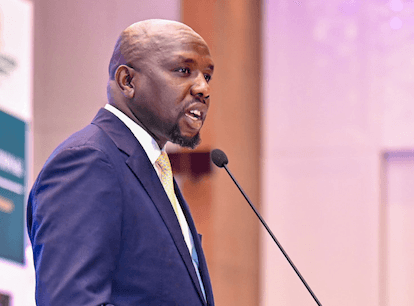
Kisii
Senator Richard Onyonka wants the Senate to investigate how the Independent
Electoral and Boundaries Commission (IEBC) determines and distributes polling
stations in foreign countries.
The law allows the IEBC to put in place mechanisms that enable Kenyans living abroad to participate in presidential elections.
According to IEBC data, the registration of Kenyans living in the diaspora accounted for only 0.05% of the voter register in the 2022 General Election.
In the 2022 polls, IEBC registered voters in Uganda - (Kampala), Tanzania - (Dar-Es-salaam and Arusha), Rwanda - (Kigali), Burundi - (Bujumbura) and South Africa - (Pretoria).
Others were South Sudan - (Juba), United States of America -
(Washington DC, New York and Los Angeles), United Kingdom - (London), United
Arab Emirates - (Abu Dhabi and Dubai), Qatar - (Doha), Germany - (Berlin) and
Canada - (Ottawa, Toronto and Vancouver).
In a statement published by the Parliament of Kenya, the vocal lawmaker sought a response from the Senate’s Justice, Legal Affairs, and Human Rights Committee to clarify how the IEBC selects polling centres for Kenyans living abroad.
The number of registered voters in the diaspora in 2017 was 4,223, as compared to 10,444 registered voters in 2022.
“The Independent Electoral and Boundaries Commission (IEBC), as required by Article 88(4) of the Constitution and Regulation 34 of the Elections (Voter Registration) Regulations 2012, is responsible for ensuring continuous registration of Kenyan citizens abroad,” he told the House.
Onyonka has recently been popularising former Interior Cabinet Secretary Fred Matiang’i’s presidential bid ahead of the 2027 presidential contest.
According to an IEBC report, the commission used several criteria to map out registration centres.
These included the presence of a Kenyan mission (embassy, high
commission, or consulate) as stipulated by law, the number of registered
citizens with Kenyan missions in host countries, a conducive political
environment in the host countries, and financial sustainability to support
logistical, operational, and administrative costs of conducting such
activities.
Onyonka urged the Senate committee to outline the procedures for diaspora voter registration, civic education, and ballot casting.
According to the statement, Onyonka reiterated the need for clear provisions to ensure transparency, accountability, and access to information for Kenyans abroad.
He further argued that voters outside the country must be well-informed about their eligibility, rights, and the exact locations of polling stations within their respective regions.
Onyonka’s remarks come amid the opposition’s push for inclusion in the IEBC commissioners’ selection process.
Appearing before the National Assembly Committee on Defence, Intelligence and Foreign Relations recently, the Diaspora Working Group, which advocates for electoral participation among Kenyans living overseas, emphasised that every Kenyan, regardless of location, has a constitutional right to vote
Kenyans in
the diaspora have called for more polling stations ahead of the 2027 general
elections, citing the need to uphold their constitutional right to vote and
enhance their participation in Kenya’s governance.



















